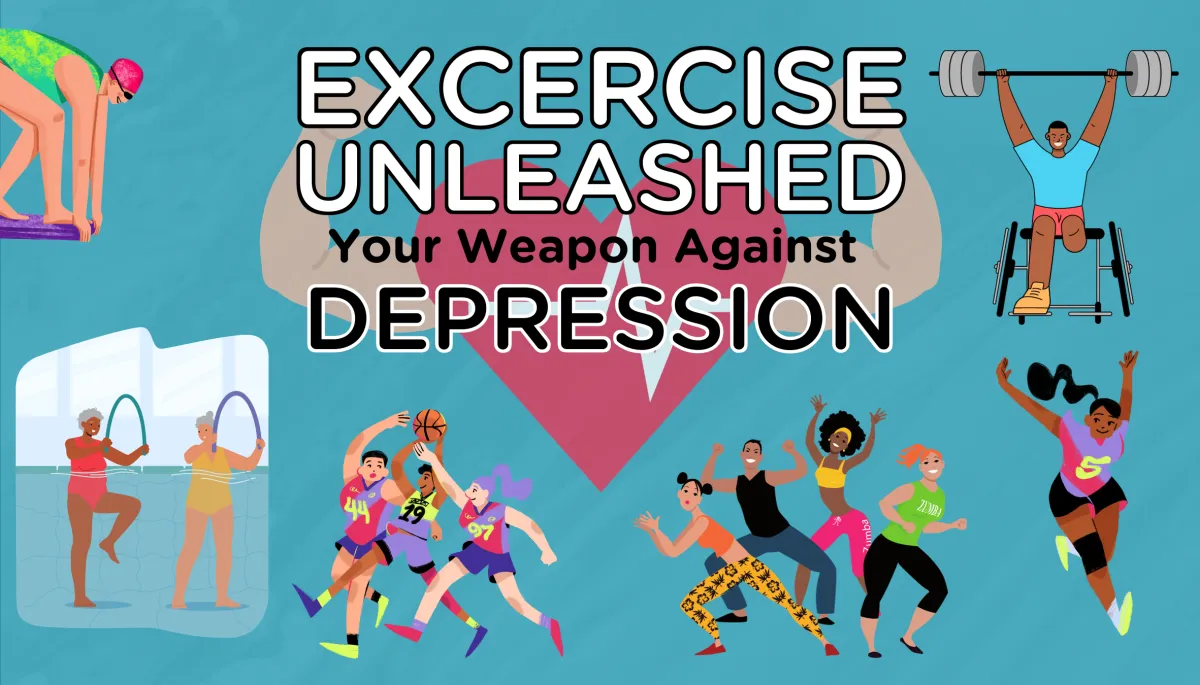General Inquiries: (587) 333-6349 - info@sanostate.com



Excercise Unleashed: Your Weapon Against Depression
“- integrating enjoyable exercises into your routine can enhance long-term sustainability.” - Emily Christensen
Depression is an omnipresent global mental health concern. In Canada, Approximately 1 in 8 adults will meet the criteria for depression at one point in their life
Some common symptoms of depression include:
Depressed or low mood
Loss of pleasure during previously enjoyed activities
Changes in weight or appetite
Sleep disturbances
Decreased energy
Poor concentration
The primary treatments prescribed for depression typically involve medications and psychotherapy–both of which are recognized for their efficacy in symptom reduction. Combining medications with psychotherapy often yields the best results in the treatment of depression. Beyond medication and psychotherapy, contemporary research has highlighted exercise as another impactful treatment option for managing depression. However, this does not get the attention it should. How often does a doctor prescribe an exercise regime?
Why is exercise effective for depression?
Exercise is effective for various reasons, with one of the most significant explanations revolving around the release of endorphins during physical activity. These endorphins offer numerous benefits, including mood improvement, promotion of sleep, stress relief, and enhancement of mental function. Research indicates that the positive impact exercise has on depression can have a lasting effect, rendering it a valuable option for those experiencing consistent depressive symptoms.
In addition to its effectiveness, exercise emerges as a low-risk and cost-effective option for treating depression. Exercise regimens can be easily tailored to accommodate individual athletic abilities, budget constraints, and schedules. This creates some fluidity for those wanting to integrate or enhance their exercise routine. Exercise can also be integrated with other effective treatments for success.
However, implementing an exercise routine can be quite difficult…
Depression symptoms such as decreased motivation and energy can make it difficult to engage in treatment, especially treatment involving consistent exercise. Making a commitment to exercise regularly can become taxing and overwhelming for people with depression. However, there are ways to make exercise a more feasible treatment option for depression.
1. Identify your interests
Discover what types of exercise are most enjoyable for you! Tailoring your workout to align with your interests is a key strategy to boost motivation and sustain your enthusiasm for exercise. Building connections with individuals with similar exercise preferences can establish a support system –in or out of the gym! Moreover, integrating enjoyable exercises into your routine can enhance long-term sustainability. It can actually be easier than you think, too.
2. Make your exercise routine simple and realistic
Adapting your approach to exercise can make it less overwhelming and more sustainable. Simplify your exercise routine to fit within your schedule and budget. When goals are simple and realistic, you are likelier to stick to and achieve them. This is especially beneficial for individuals dealing with depression, as simplified exercise routines are easier to engage with, even when motivation is low. Even basic exercises, such as walking for 30 minutes three times a week, have proven effective in managing depressive symptoms. The key lies in maintaining consistency.
3. Engage with professional support
Engaging with professionals who prioritize your mental health can significantly enhance the implementation of your treatment plan. Like other psychological interventions, doctors and psychologists can provide ongoing support by monitoring your exercise routine, tracking progress, and acknowledging successes. Collaborating with medical and psychological professionals allows for a personalized approach to make exercise most effective for your specific needs and circumstances.
Dealing with depression poses numerous challenges in daily life, often making the commitment to exercise daunting. However, through the identification of personal interests, simplification of exercise routines, and collaboration with mental health professionals, exercise is a possible treatment option for individuals with depression.
Customized approaches not only make exercise more achievable but also create a supportive environment for those dealing with the complexities of depression. Adopting personalized methods enables individuals to take meaningful steps toward enhancing their mental health and overall well-being. There is no one-size-fits-all; you do not have to go through it alone!
If this is an area where youcould use support, click HERE or call 587-333-6349 to connect! 💙
References
Canada, P. H. A. of. (2016, December 30). What is Depression?. Canada.ca. https://www.canada.ca/en/public-health/services/chronic-diseases/mental-illness/what-depression.html
DiLorenzo;Bargman EP;Stucky-Ropp R;Brassington GS;Frensch PA;LaFontaine T;, T. M. (1999). Long-term effects of aerobic exercise on psychological outcomes. Preventive medicine. https://pubmed.ncbi.nlm.nih.gov/9973590/
Mayo Clinic Staff, M. (2017, September 27). Depression and anxiety: Exercise eases symptoms. Mayo Clinic. https://www.mayoclinic.org/diseases-conditions/depression/in-depth/depression-and-exercise/art-20046495
Sharma, A., Madaan, V., & Petty, F. D. (2006). Exercise for mental health. Primary care companion to the Journal of Clinical Psychiatry. https://www.ncbi.nlm.nih.gov/pmc/articles/PMC1470658/
Disclaimer
Our content is for informational and educational purposes and is not a replacement for professional advice, diagnosis, or treatment. If you're facing mental health concerns, please seek help from a qualified professional for personalized guidance. Every individual's situation is unique, so use the information here at your discretion. While we strive for accuracy, the field of psychology is ever-evolving, and our content may not always reflect the latest research. Please prioritize your privacy by avoiding sharing personal information in comments or interactions. Your well-being is our top concern, so use our content for educational purposes, but remember to rely on professionals for your specific needs.
General Inquiries:
Our Locations:
Additional Resources:
About Us:
We strive for excellence in psychological treatment. We are committed to providing professional, caring, innovative, and research-based services.
© 2024 Sano State Taylored Psychology. All Rights Reserved.

